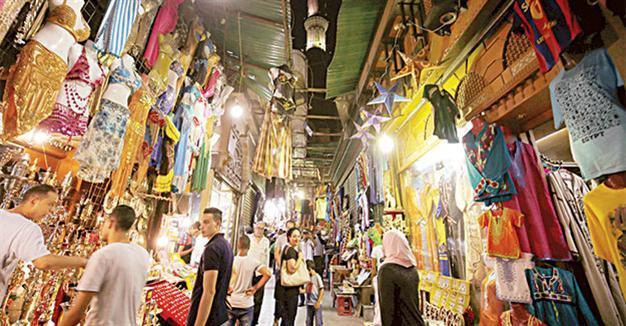In Egypt, IMF deal brings austerity few can afford
CAIRO - Reuters

People walk around shops at al-Hussein and Al-Azhar districts in old Islamic Cairo, Egypt August 18, 2016. Picture taken August 18, 2016. REUTERS photo
A few years ago Imad would not have imagined himself queuing in the Cairo sun for a weekly ration of subsidized baby milk. But rising prices mean his civil servant’s salary barely lasts the month and the government is tightening its belt further.
“Electricity is up, food is up. The only thing that doesn’t rise in Egypt is people’s pay yet all they talk about is cutting subsidies,” said Imad, smartly-dressed like many in the line.
Squeezed by economic and political turmoil since the 2011 uprising that toppled Hosni Mubarak, Egyptians are preparing for a new era of austerity.
The reforms are part of a program to cut the budget deficit and rebalance currency markets promised to the International Monetary Fund (IMF) to secure $12 billion of lending over three years.
But political opposition to measures involving subsidy cuts, devaluation and new taxes while tens of millions rely on state-subsidized food, make the program ambitious.
The cost of failure, say economists, is high. The budget deficit is near 10 percent of GDP. Inflation is 14 percent. A shortage of foreign currency has hit imports.
Foreign investors are unable to repatriate profit and some are shutting shop, hit by capital and import controls imposed over the last 18 months.
Businesses are unable to secure enough foreign currency to import components or pay a premium above 40 percent to obtain dollars on the black market. They talk of survival not growth.
“It’s very clear that circumstances have led Egypt to really need IMF support... it will have to make changes to ensure the implementation of the plan it presented to the IMF,’ said Angus Blair, chief operating officer of Pharos Holding.
“The system in Egypt, as in overall governance, is slow... and this is a reform program that calls for quick action and bravery, especially because some of the impact will be inflationary.”
Successive governments have balked at cutting subsidies after President Anwar Sadat removed them on flour, rice and oil in 1977, part of an effort to secure IMF-backed financing.
He reinstated them after poor Egyptians rioted, attacking symbols of the growing divide between them and wealthier classes they saw as the beneficiaries of Sadat’s policy to liberalize the economy after more than a decade of “socialism.”
Though Egypt has returned to the IMF virtually every decade since the 1970s, implementation of reforms has been mixed. Many Egyptians are uneasy with a program they see as being foreign imposed and are convinced it will hurt all but the richest.
More recently, Egypt negotiated two IMF deals that were never finalised, including a $4.8 billion loan initially agreed in 2012. The reluctance with which policymakers have previously approached reforms means investors are not rushing back yet.
Chris Jarvis, head of the IMF’s Egypt mission, said those deals had failed due to a lack of political will at the top to implement reforms. This time, he said, political commitment appeared stronger.
President Abdel Fattah al-Sisi said last week he would not hesitate “for one second” to take the difficult steps necessary to ensure Egypt lives within its means.
Electricity prices were raised by 20-40 percent this month under a five-year program that will see power subsidies gradually eliminated. Petrol subsidies are next. Reforms to the bloated civil service have been passed by parliament, though heavily diluted.
